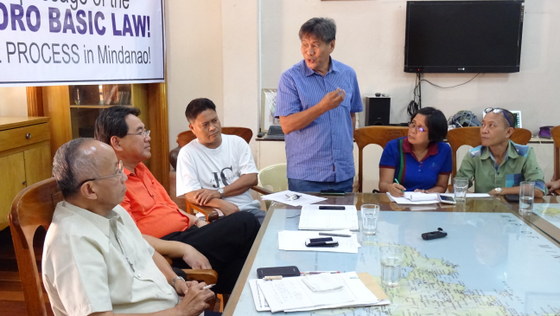
CAGAYAN DE ORO CITY—Rep. Rufus Rodriguez, chairman of the adhoc committee on the BBL in the House of Representatives, has said that the Bangsamoro Basic Law is really federalism with another name.
The BBL gives 58 exclusive powers to the Bangsamoro government and only nine reserved powers to the national government. Aside from that, 14 concurrent powers plus 11 additional powers will be shared by both the Bangsamoro and the central/national government.
“Overall, 83 powers of government is granted to the Bangsamoro as against the nine powers reserved to the national government. Never in the history of legislation regarding our Moro brothers has there been so much given as far as a law is concerned than the BBL,” Rodriguez pointed out.
All these powers are enumerated in Article V (Powers of Government) of the BBL, which clearly defines the exclusive powers of the Bangsamoro , the reserved powers of the national government, and the concurrent powers of both governments.
“This is the first time in the history of our nation that a piece of legislation clearly spells the delineation of the powers of government. This is really federalism that we have been fighting for for a long time,” he said.
As enumerated in Section 1, Article V of the BBL, the reserved powers of the central/national government are (1) defense and external security; (2) foreign policy; (3) coinage and monetary policy; (4) postal service; (5) citizenship and naturalization; (6) immigration; (7) customs and tariff; (8) common market and global trade; and (9) intellectual property rights.
The concurrent powers are (1) social security and pensions; (2) quarantine; (3) land registration; (4) pollution control; (5) human rights and humanitarian protection and promotion; (6) penology and penitentiary; (7) auditing; (8) civil service; (9) coastguard; (10) customs and tariff; (11) administration of justice; (12) funding for maintenance of national roads, bridges and irrigation systems; (13) disaster risk reduction and management; and (14) public order and safety.
Section 3 of Article V enumerated the 58 exclusive powers of the Bangsamoro government, among which are: (1) economic and cultural exchange; (2) barter trade and countertrade with ASEAN countries; (3) free ports; (4) creation of sources of revenue; (5) customary laws; (6) ancestral domain and natural resources; (7) customary justice; (8) establishment of Awqaf (endowment) and charitable trusts; and (9) authority to regulate power generation, transmission and distribution.
“Article V practically is establishing federalism for the first time in the history of our country in a document called the BBL. This should become a law,” Rodriguez said.
During the public hearing on the BBL conducted by the adhoc committee in Iligan City in November 2014, lawyer Franklin Quijano said that the BBL sets the stage for federalism in Mindanao.
Quijano, who was mayor of Iligan from 1998 to 2004, is the government chief negotiator in the peace talks with the Rebolusyonaryong Partido ng Manggagawa ng Mindanao (RPM-M) that is brokered by the Balay Mindanaw Foundation, Inc., (BMFI) as independent secretariat.
BMFI, which serves as secretariat of the Tulay Kalinaw Mindanaw (Tulay KaMi or Bridge of Peace in Mindanaw), is at the forefront of the Mindanao campaign for a shift to the federal form of government.
Tulay KaMi is a multi-sectoral peace conversation among civil society organizations (CSOs) and agencies working and advocating towards peacebuilding and conflict resolutions in Northern Mindanao. It was convened by Archbishop Antonio J. Ledesma, S.J., D.D., the Archdiocese of Cagayan de Oro (ACDO) and the BMFI.
Tulay KaMi had a “peace conversation” with Rodriguez on the BBL on April 11 at the Bishop’s House. During that conversation, Rodriguez assured everyone that he continues to champion the BBL’s approval in Congress. (Bong D. Fabe)